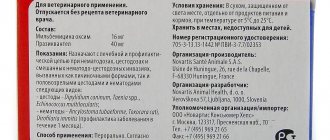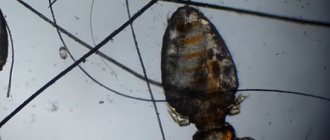Worms are dangerous to the health of not only the cat itself, but also for its owners. Therefore, the list of important and necessary procedures includes deworming measures.
Let's look at how to deworm a cat at home, which anthelmintic drugs are the most effective and safe, as well as how to properly draw up a preventive action plan.
Why is deworming necessary?
Deworming is a set of actions and measures that are aimed at ridding an animal of worms and preventing its re-infection. Secondary invasion is more than likely because the development cycle of helminths from egg to adult is about 4 months.
During cat hygiene procedures, the possibility of infection with worms is 100%. Therefore, it is necessary to deworm a cat often - at least 3-4 times a year.
Infection with worms is the most “popular nuisance” even among domestic cats. In fact, this serious problem can cause significant damage to your pet's health.
In the process of development and reproduction, worms feed on the tissues of internal organs, the blood of the animal, disrupt the functioning of the gastrointestinal tract, and undermine the immune system.
An infected cat becomes a source of danger for family members. Children are especially defenseless against helminthic infestations. To protect the family from infection, a domestic cat should be dewormed regularly and not wait for obvious manifestations of the disease.
A few more reasons why it is necessary to worm your pets systematically:
- cats are constantly infected with worms: when they eat raw meat, fish, offal, pick up pieces of food from the floor, and also during cat washing;
- waste from worms poisons the body of an infected cat and undermines its health;
- some worms are able to overcome the placental barrier and infect kittens in utero, this often leads to the birth of weakened offspring or their death;
- infected cats are emaciated, stunted, and suffer from anemia.
When and how often to worm a cat
Calculating how to properly deworm a cat is quite easy. To do this, you need to understand the purpose of the event:
- Prevention
. If the pet is kept at home, then it is treated 2 times a year. If access to the street is not limited, then an anthelmintic is given every quarter.
- Treatment
. The anthelmintic is given twice with a break of 10-14 days. Remember that the anthelmintic does not affect eggs.
The schedule can be shifted when traveling abroad or outdoors, undergoing surgery or vaccination, as well as participating in exhibitions. To avoid complications, including overdose, be sure to listen to the advice of your veterinarian and follow the basic rules.
Symptoms of the presence of worms
In domestic cats, helminthic infestation most often occurs through the gastrointestinal tract: during eating or by licking. Subsequently, the worms “develop territories” in accordance with their belonging to a particular species.
Adults can live and feed in one organ, and lay eggs in another. With helminthic infestation, worms can affect not only parts of the intestines, but also the liver, heart, lungs, and brain.
Worms take nutrients from the body, negatively affect the functioning of internal organs and systems, and poison the cat with toxins and waste products of their vital activity.
The insidiousness of the invasion is that in the initial stages it is difficult to determine the presence of the disease by the appearance and well-being of the cat. That is why veterinarians strongly advise worming your cat regularly, regardless of external manifestations.
Clearly expressed symptoms of infestation appear when the body is seriously affected by worms:
- The first and main way to determine whether a cat has worms is to monitor its stool. Tapeworms can be seen in feces with the naked eye. They look like grains of rice.
- The fur becomes dull. Significant hair loss may occur. This occurs due to lack of nutrients.
- An indomitable appetite appears. The cat is forced to feed not only itself, but also the worms.
- As another scenario, loss of appetite is a consequence of intoxication of the body.
- Bloating, constipation, vomiting, flatulence. There are so many worms that they block the gaps in the intestines and interfere with the passage of food. It is even possible that the intestinal wall may rupture.
- The cat suffers from itching in the area of the anus. She often licks and bites this place, injuring the delicate skin.
- The gums and mucous membranes of the mouth are pale. This is a sign of anemia that was caused by an infestation.
- Apathy and drowsiness. Worms take energy from the animal in the process of disrupting the functioning of internal organs.
- Weight loss against a background of visible well-being.
Infestation of individual organs by worms can be determined by characteristic signs:
- worms in the liver - yellowing of the mucous membranes: eyes, eyelids, mouth;
- vessels and membranes of the brain are invaded - purulent discharge from the eyes;
- lungs are affected - cough, nasal discharge.
What happens if you don't deworm?
The main goal of this procedure is to rid the cat of parasites. They, in turn, can irreparably damage some vital organs:
- liver;
- intestines;
- spleen;
- heart.
To grow and function, worms require energy, which they draw from nutrients contained in various organs. Moreover, sometimes they multiply so rapidly that they eventually fill all the tubules and passages. All this leads to disruption of the overall functioning of the body and a sharp deterioration in well-being.
Sources of parasite infection
Most owners of domestic cats are confident that if their pet does not walk outside and does not communicate with other animals, then it cannot become infected with any parasites. This, unfortunately, is not the case - not even the most protected cat is immune from infection with ecto- and endoparasites (worms).
There are countless sources of helminth infection. A person can bring several types of worms into an apartment on street shoes. Larvae, eggs, cysts and even living organisms can be found on the surface and in the tissues of raw meat, fish, in water - in puddles, in a river. Some types of worms are carried by fleas and other blood-sucking animals.
Parasitic infestation of pets is almost inevitable. It's not even about avoiding invasion. The point of deworming is to prevent worms from multiplying and expel them from the body in a timely manner. Therefore, it is necessary to worm cats regularly.
Diagnostics
A final diagnosis can only be made by a veterinarian after studying the anamnesis and taking the animal’s feces and blood for analysis. A stool sample is collected for three consecutive days to rule out a “false negative diagnosis.”
If the owner notices particles of worms in the cat’s feces or on the animal’s body, then this should also be reported to the veterinarian.
Important!
Please note that parasite larvae may persist in the milk of nursing cats. Therefore, even if the mother cat has a negative test for worms, it is necessary to carry out thorough anthelmintic therapy for the babies.
Types of helminths in cats
In order to properly deworm a cat, it is necessary to find out what type of worms it is affected by. This issue is solely within the competence of the veterinarian. Only he can determine the type of parasite, prescribe adequate treatment and select appropriate medications.
The most common types of endoparasites:
- Roundworms: roundworms, hookworms, nematodes. The small intestine is affected. This type of worm is most common in cats. Even newborn kittens can become infected with them through their mother's milk. Adult cats become infected through feces. These worms secrete a toxin that poisons the animal's body. They block the bile ducts, affecting the heart and lungs. They lay eggs around the anus, which causes unbearable itching.
- Tapeworms (flatworms) are cestodes. Cats can become infected with them through raw meat. Fleas can also be carriers of cestodes. Their habitat is the intestines. The “family” of these worms is a ribbon up to 70 cm long, which consists of segments with larvae. Some parts may be passed out in the stool. These worms often cause intestinal obstruction, which often leads to the death of the animal.
- Flukes are trematodes. The most dangerous worms, the main “tool” of which is powerful suction cups. With their help, flukes are able to gain a foothold in the heart, lungs, and liver and suck the life out of these organs. Flukes cause diseases such as paragonimiasis and opisthorchiasis. Sources of infection can be raw fish and untreated water.
Where can a cat become infected with worms?
Cats are at risk of becoming infected with worms from birth. Parasite eggs can enter the body through the milk of an infected mother. But there are other sources of infection that are best known about before symptoms appear. There are many options for what you can give your cat. Preventive prevention is the best way to prevent worms.
- Milk from an infected mother. Some larvae reach the size of a wheat grain, and some are completely invisible and are able to penetrate the mammary glands and the animal’s body through the skin.
- Feeding on rats and mice. Rodents have long been considered carriers of various infections, including worms.
- Presence of fleas. When an animal picks fleas in its own fur, it is susceptible to infestation by larvae through the ingestion of parasites.
- Eating meat from birds, animals and fish. Adult worms can be seen in rotten meat with the naked eye. When they enter the body, they do not die, but adapt and grow successfully, destroying the animal from the inside.
- Drinking river water. It contains not only infections, bacteria, but also eggs of parasites left over from decomposed fish, cancerous bodies and garbage.
- Contacts with infected animals. Sometimes animals lick each other's genitals, and the fur around the anus may contain traces of feces or larvae. Animals with cestodes are capable of infecting healthy cats through the air.
- Shared meals. Often, pets are fed from the same dish, without realizing that toxocara, roundworms and other types of worms can pass into a healthy body through food and water.
- Earth, sand. Outdoor animals are often fed from the ground. Throw leftover food onto the sidewalk, lawn or other areas of the ground. You can often find cats and dogs eating food abandoned by people on the beach. Earthen and sand grains may contain helminth eggs, which will successfully enter the cat’s healthy body.
When to carry out processing
There is no doubt that anthelmintic measures should be carried out when the first signs of infestation are detected. In this case, you cannot hesitate: the sooner treatment begins, the fewer risks to the cat’s health.
Modern anti-invasive drugs make it possible to deworm kittens from one month of age without harm to their growing body. A responsible owner will strictly adhere to the preventive worming schedule - once every 3-4 months. These activities should be continued throughout the pet’s life.
Quite often situations arise when an extraordinary procedure is necessary. You will have to worm your cat:
- at least 10 days before the intended mating;
- at least 10 days before scheduled vaccination;
- 3–4 weeks before sterilization or castration surgery;
- after the end of lactation of a nursing cat.
Veterinarian recommendations regarding the use of anthelmintics
Any drug should be administered strictly following the dosage, which depends on the cat’s body weight. Below are recommendations from veterinarians regarding the use of anthelmintics.
- Before giving your cat an anthelmintic, you must use flea and tick drops.
- Only healthy cats can be given anthelmintic prophylaxis.
- It is advisable to carry out the treatment on weekends so that you can observe the condition of your four-legged friend.
- 5 hours after the cat has received a dose of the anthelmintic, he needs to be given a small amount of activated carbon.
- In cases of constipation, it is worth lubricating the anus area with Vaseline oil.
- Repeated use of the anthelmintic is possible 15 days after the previous use.
The best anti-helminth remedies
Modern veterinary pharmacology offers a fairly wide range of anthelmintic drugs. They differ from each other in their focus on a specific type of worm, in the method of influencing them, in the form of release.
The action of anthelmintic drugs is as follows:
- they have a detrimental effect on the nervous system of worms;
- have a paralyzing effect;
- slow down and stop metabolic processes in the body of the worm;
- literally “dissolve” helminths.
We offer the top 10 most effective and proven drugs for worming domestic cats.
| Name | Spectrum of action | Release form | pros | Minuses |
| Albendazole | Against liver flukes | Powder, tablets | High efficiency | Precise dosage required. Toxic |
| Dirofen | Destroys tapeworms and roundworms | Suspension | Quick effect, few contraindications | |
| Drontal | Target – round and tapeworms | Pills | Allowed for pregnant cats and kittens. No adverse reactions Can be used as a prophylactic agent | |
| Kanikvatel Plus | Against round and tapeworms | Pills | Acts quickly, effectively, and is gentle on the cat’s body | |
| Pirantel | Destroys hook and tapeworms | Pills. Suspension | Can be used by pregnant and lactating cats | Side effects: lack of appetite, vomiting, diarrhea |
| Piperazine | Effective against roundworms, hookworms | Powder. Pills | Quickly eliminated from the body | Narrowly targeted action |
| Poliverkan | Wide spectrum of action. Effective against nematodes and cestodes | Soluble tablets | Allowed for kittens from 1 month | Prohibited for pregnant cats |
| Prazitel | Wide spectrum of action | Pills. Suspension | Safe for kittens, pregnant and lactating cats | Low efficiency |
| Prazicide Plus | Kills flatworms and nematodes | Suspension. Pills | One application is enough | May cause intolerance |
| Profender | Wide spectrum of action | Drops on the withers | Convenient to use. High efficiency | High price |
Pharmacologists are developing more and more new drugs against worms with a wide spectrum of action - low toxic and safe for the animal. The table provided will help the amateur navigate a large number of offers, but in no case does it imply an independent selection of the drug.
There is an opinion that folk remedies - herbal decoctions, crushed seeds - are better than pharmacological drugs. This is not true: herbs can be just as dangerous and toxic.
When treated with traditional methods, it is more difficult to maintain the dosage. This path is much longer and requires more time and effort, which does not always lead to the desired result.
Expert opinion
Chepa Natalya Semenovna
Veterinarian
Ask an expert
I would like to add two more drugs to the list of antiparasitic agents recommended for deworming. The first, Milbemax (beef-flavored tablets), is prescribed for the treatment and prevention of cestodiasis and nematodes (dipylidiasis, toxocariasis, dirofilariasis, etc.). Available in two forms: for kittens and small cats and for large cats. The second drug is Stronghold drops on the withers. Stronghold acts against intestinal roundworms, dirofilariasis and external parasites (fleas, ear and scabies mites, lice). Please note that the drug is not used for the prevention and treatment of helminthiasis caused by tapeworms. Available in three forms: for kittens weighing up to 2.5 kg, for cats weighing 2.6 - 7.5 and over 7.5. Both drugs are used by animals from 6 weeks of age and are approved for pregnant and lactating women.
Prevention
Disease prevention plays a major role in keeping a pet, so it is extremely important to follow a few simple recommendations:
- frequent wet cleaning of premises;
- minimizing contact with any street animals;
- exclusion of raw meat and fish from the pet’s diet;
- keeping the litter box clean;
- Regularly checking your pet for helminthic infestations at the veterinary clinic.
Prevention with folk remedies will prevent the appearance of parasites in your pet . Among other things, effective control of worms does not always require the purchase of very expensive anthelmintic drugs, the effects of which are often quite aggressive.
Return to content
Rules for the use of drugs
The procedure for expelling worms does not require keeping the cat in a hospital. Modern drugs allow you to deworm a cat at home. Only a veterinarian can prescribe the drug after examining the animal. Based on the results of the tests, the specialist will determine the type of worm and the degree of damage, and then recommend the appropriate drug and its dosage.
The drug is given to the cat once, it is better to do it in the morning, before meals. After 2 weeks, the medicine is given to the animal again at the recommended dose. After a few days, you should take tests and visit a doctor to confirm the success of the worming procedure.
Taking the drug alone is not enough. It is necessary to rinse the litter box after each cat's use of the toilet, and frequently wash and disinfect her sleeping mat.
The drug is taken depending on the form of its release. It is convenient to give drops and suspensions directly into the cat’s mouth from a pipette or using a syringe without a needle. The drug should be instilled or poured into the cat's cheek.
The tablet should be crushed and dissolved in a small amount of water. You can pour the powder into the mouth - on the root of the tongue. Then you should close the cat’s mouth and stroke its throat, thereby forcing it to swallow the drug.
The cat does not like this procedure, so you will have to use force: experienced cat breeders advise swaddling it tightly to avoid scratches. It is imperative to make sure that the medicine is “as prescribed.”
The drug can be mixed with food. However, this method does not always work: cats sense the slightest impurities in food and refuse to eat.
Owner stories
Sofia: “We adopted a cat from a shelter. It turned out that the cat had worms. Moreover, there were a lot of them, all the feces were strewn with larvae and parts of parasites, such small white things. We suffered with her until the veterinarian advised us this treatment regimen: Kanikquantel suspension three times with an interval of 2 weeks. We're doing well now."
Tamara: “My son brought a kitten from the street. I immediately realized that the cat had worms - the baby’s tummy looked like an inflated balloon. Poor thing, he suffered while he was a wanderer. The veterinarian said to give Prasitab tablets. One tablet is designed for an animal weighing 4 kg. I gave a little less than half, crushed it into powder and diluted it with water. This mixture was poured into the baby using a syringe without a needle.”
Is deworming necessary before vaccination and sterilization?
If a healthy animal has to undergo a planned surgical intervention (sterilization or castration), it is necessary to provide him with conditions for a speedy recovery. The body of a cat affected by worms is weakened, so the risk of postoperative complications is high.
Worming your pet before surgery is a necessary and mandatory measure to protect its health.
Vaccination is also carried out only for absolutely healthy cats. Worm infestation is one of the contraindications to vaccinations. Regardless of whether symptoms of worms are present or not, it is necessary to worm your pet before vaccination.
If a young cat is to be sterilized, the presented scheme of prevention, routine worming and vaccination will be very useful:
- at the age of 2–3 months, kittens receive their first vaccination; the cat should be dewormed at least 10 days before vaccination;
- After about a month, re-vaccination is carried out;
- after changing teeth, kittens are again supposed to be dewormed, and after 10 days they undergo a routine vaccination;
- after 2–3 weeks, if the animal is in good health, a sterilization operation is performed.
If after treatment the animal is poisoned
As a rule, possible complications after treatment for worms arise due to poisoning of the body, provoked by the decomposition of dead parasites inside the cat. Malaise sometimes occurs due to inaccurate dosage of medications used to treat an infected pet, as well as due to intolerance to a particular medication. If vomiting occurs, the cat has difficulty breathing, muscle tremors or increased lethargy are observed, it is necessary to urgently call a veterinarian.
At the Murkosha shelter, worms are poisoned from admitted kittens only after all possible infections have been excluded and under the strict supervision of a veterinarian. Treatment should begin no earlier than 2 weeks after you take the kitten into your home, provided that it is absolutely healthy. Also, you should not immediately use different drugs - for helminths, fleas, ticks, etc., otherwise intoxication cannot be avoided.
Deworming a pregnant or lactating cat
Some types of worms are able to penetrate the placenta of a pregnant cat and infect embryos. To avoid infestation of the offspring, the cat and male male must be wormed at least a month before the intended mating. This condition is mandatory, regardless of whether the cat has been wormed as planned or not.
You should know that pregnancy and lactation (the period of feeding kittens) are contraindications to taking anthelmintic drugs. All of them are toxic and can cause congenital deformities in unborn kittens or lead to miscarriage.
If worms are found in a pregnant cat, and this noticeably worsens her condition, she will still have to be dewormed, despite the possible risks.
There are medications that are allowed for pregnant cats:
- Drontal, Dirofen – used only in the second half of pregnancy;
- Profender can be given in the early stages of pregnancy, except for the last three weeks.
Only a veterinarian should prescribe the drug. There is no point in resolving this issue on your own.
New deworming remedy "Polivercan"
Some owners begin to deworm cats with a drug such as Polyvercan. This medicine has recently appeared on the consumer market and is beginning to be in demand. The peculiarity is that it is in the form of sugar cubes. Dogs love to eat it, so it is quite easy to deworm them with this drug.
Poliverkan











